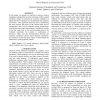Free Online Productivity Tools
i2Speak
i2Symbol
i2OCR
iTex2Img
iWeb2Print
iWeb2Shot
i2Type
iPdf2Split
iPdf2Merge
i2Bopomofo
i2Arabic
i2Style
i2Image
i2PDF
iLatex2Rtf
Sci2ools
ICASSP
2007
IEEE
2007
IEEE
Recursive Motion Estimation of Range Image
In this paper, we present an innovative recursive motion estimation technique that can take advantage of the in-depth resolution (range) to perform an accurate estimation of objects that have undergone 3-D translational and rotational movements. This approach iteratively aims at minimizing the error between the object in the current frame and its compensated object using estimated motion displacement from the previous range measurements. In addition, in order to use the range data on the non-rectangular grid in the Cartesian coordinate, we consider a combination of derivative filters and the transformation between the Cartesian coordinates and the sensor-centered coordinates. For sequences of moving range images we demonstrate the effectiveness of the proposed scheme.
Accurate Estimation | Cartesian Coordinates | ICASSP 2007 | Recursive Motion Estimation | Signal Processing |
Related Content
| Added | 02 Jun 2010 |
| Updated | 02 Jun 2010 |
| Type | Conference |
| Year | 2007 |
| Where | ICASSP |
| Authors | Hamid Gharavi, Shaoshuai Gao |
Comments (0)

